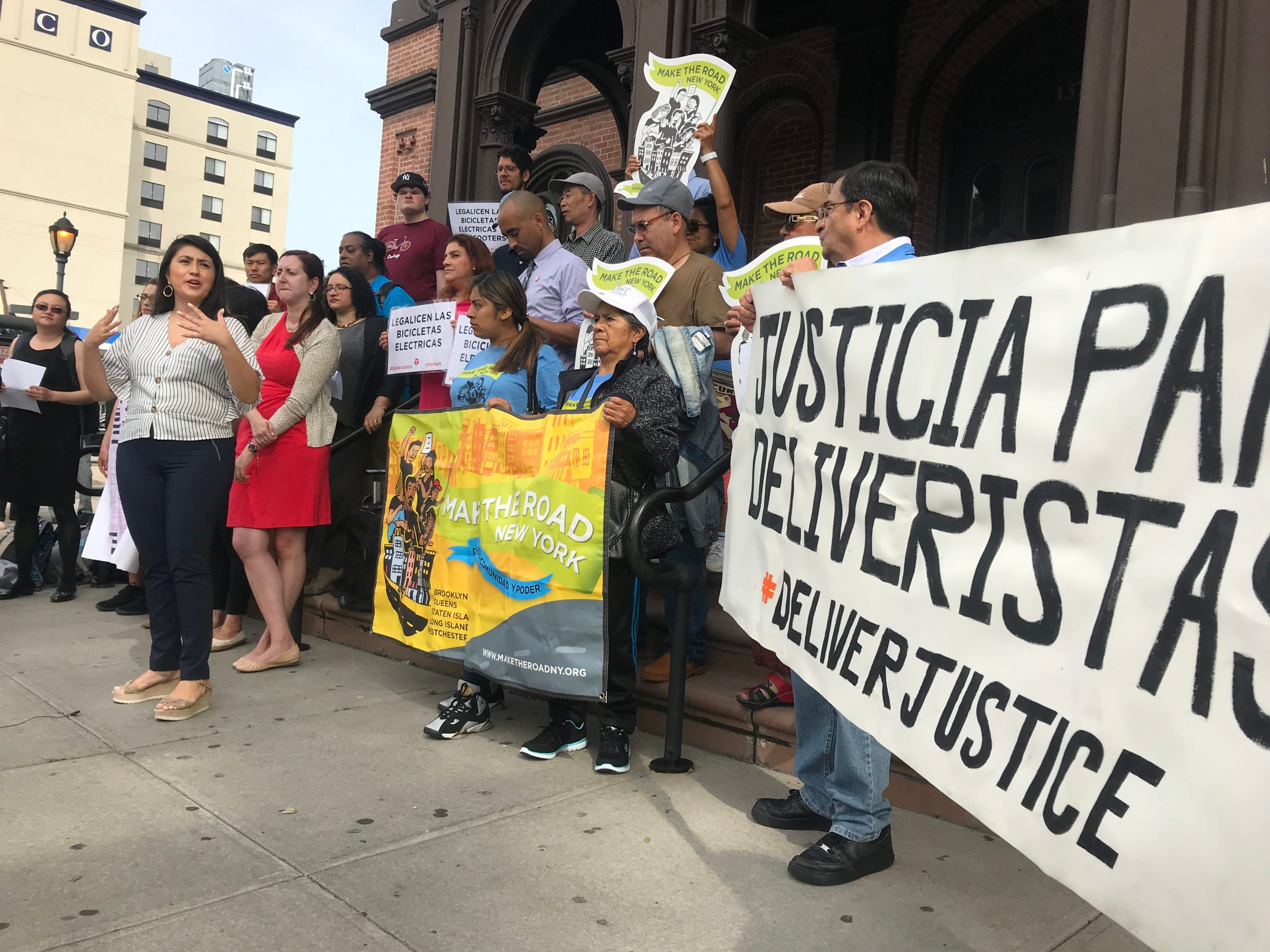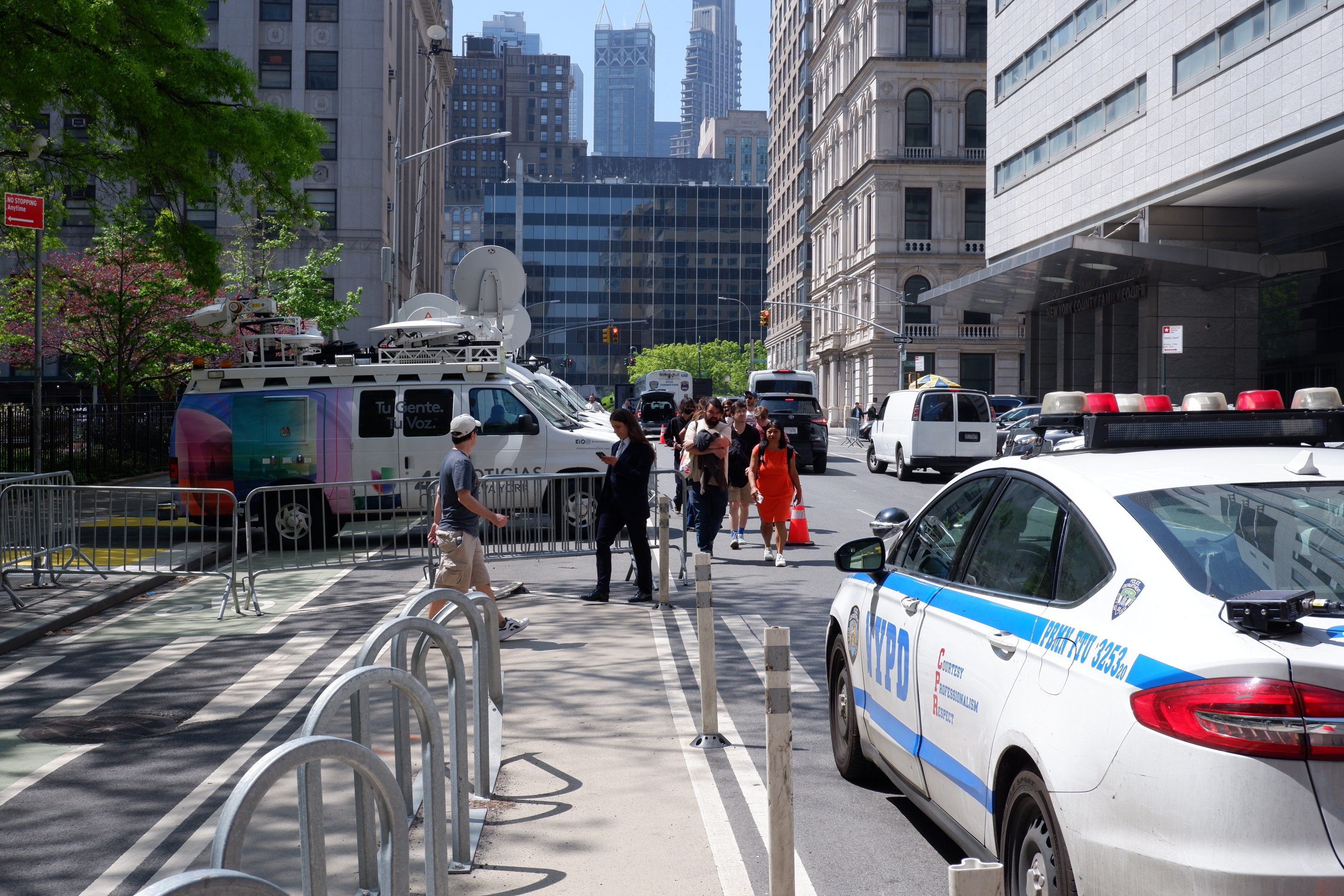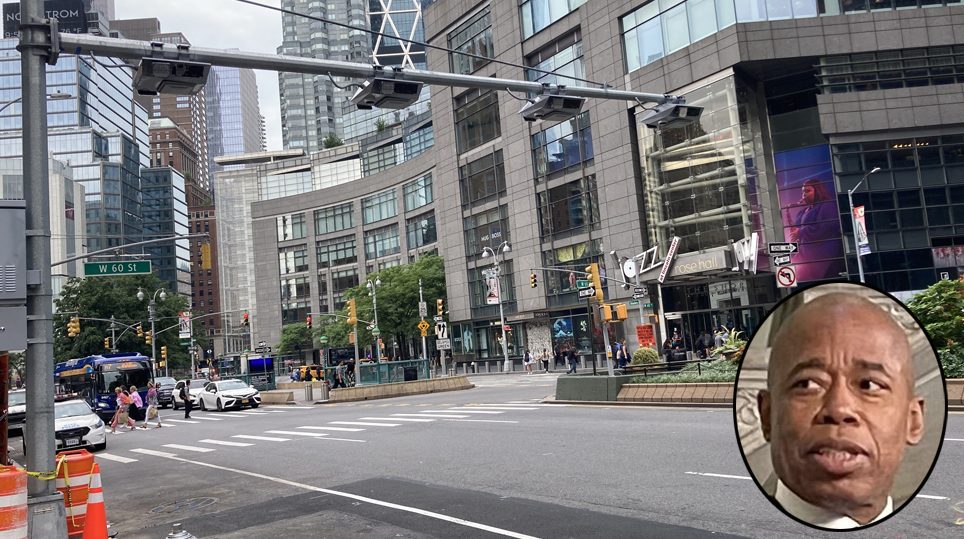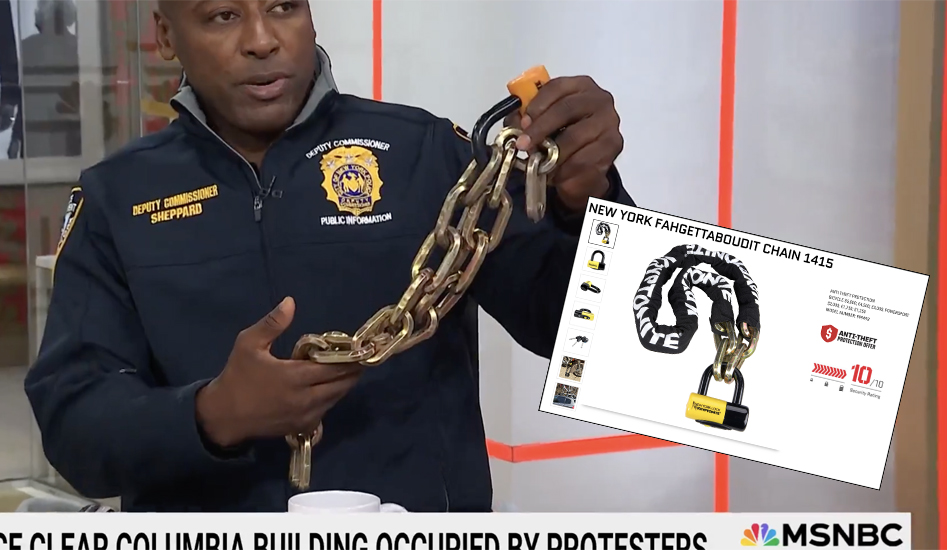E-Bike Legalization Bill Will Pass on Wednesday, Thanks to Greenway, Manhattan Scooter Exemptions
1:54 PM EDT on June 17, 2019

Delivery workers will have to wait until 2020 for justice, but it could come quickly if lawmakers get their way. Photo: Gersh Kuntzman
No shared e-scooters in Manhattan. No e-bikes or scooters on the Hudson River Greenway. No helmet requirements. Bike lanes filled with e-scooters. But, most important, e-bikes are legal.
There's a fresh new version of the e-bike and e-scooter legislation coming out of the Albany sausage factory — clearing the way for Senator Jessica Ramos's bill S5294 to be voted on this Wednesday. And, she thinks, signed by Gov. Cuomo. (The Assembly version of the bill is being carried by Nily Rozic.)
"I have been in active conversation with the second floor," Ramos told Streetsblog, referring to the location of the governor's office inside New York's ornate state Capitol. "We believe we have his support."
The latest version of the bill differs from the one your read about here. As with any form of transportation, there are a lot of moving parts. Here's what we've learned today:
First, where were we?
Ramos's original bill sought to define new classes of mobility for electric bikes and scooters not currently covered by state law, namely electric bikes that operate with throttle control. Such bikes have been the subject of crackdowns by the NYPD because they tend to go faster than pedal-assist electric bikes — and because they could not be regulated under state law because they don't carry license plates even though they are motorized vehicles.
Ramos's bill still creates three new classes of electric bikes: pedal-assist bikes that can't go over 20 miles per hour, throttle-controlled bikes that can't over 20 miles per hour, and throttle-controlled bikes that can go up to 25 miles per hour — except the new version makes that third class of speedy e-bike legal only in New York City. And it will be up to the city to regulate them (the Council has a package of bills).
But to be clear: this bill, if passed, ends the NYPD crackdowns, Ramos said.
"At the end of the day, this was always about justice for delivery workers," she said. "We are eliminating the NYPD's decision to stop delivery workers because the vehicles were 'illegal' or the law was too gray. We want to make it clear: they [will be] legal under this bill. They should not be stopped or ticketed or have their bikes confiscated."
The new bill, like the original, also caps legal e-scooters at 20 miles per hour. Both newly legal devices — e-bikes and e-scooters — are sort-of considered cars in part of the law, but are exempt when it comes to the specific car regulations such as insurance and registration, said Steve Vaccaro, a lawyer who specializes in bicycle-related litigation.
Manhattan to scooters: Drop dead
The bill says that localities can set up "shared electric scooter systems" in any county — unless that county is New York County: "No such shared electric scooter system shall operate ... in a county with a population of no less than 1,586,000 and no more than 1,587,000 as of the 2010 decennial census."
That population is pretty specific: Manhattan. (Update: Governors Island is also in New York County, so say goodbye to scooter-share there, too.)
Several sources confirmed to Streetsblog what everyone has been saying for weeks: That "Scooter-free Manhattan" language was a concession to senators from the borough who believe the devices are unsafe in the most congested part of the city (these same lawmakers have proposed no such restrictions on the most unsafe devices currently on our roads; car and truck operators killed 200 people last year in New York City compared to zero killed by scooter riders).
Here's another twist: The bill defines a "shared" scooter system as a system where trips begin or end in "any public highway." So it may be leaving the door open for private e-scooter rental, say from a bike shop. (More on that later in the day.)
Greenway exemption
The new version of the bill specifically bars e-bikes and e-scooters from the Hudson River Greenway, the world's most popular bike lane. Officials from the Hudson River Park had testified earlier this month against allowing the new mobility devices on the greenway. Apparently, they won.
Connie Fishman of Hudson River Park Friends, one of the officials who testified at the state hearing, did not return a call for comment. She had told Streetsblog that the state should consider widening the greenway, given its popularity, including looking into taking a lane away from cars on the West Side Highway. But that's a debate for the future.
The bill also has fine print that appears to bar e-bikes and scooters from the Niagara River greenway.
The state or the applicable city could legalize e-bikes and scooters on those two greenways in the future, the bill seems to say.
Safety issues
The latest version of the bill adds requirements for scooter operators:
- They must always have one hand on the handlebar.
- They must always yield the right of way to pedestrians.
- They cannot ride on the sidewalk.
- They cannot cling to other vehicles.
- They must be at least 16 years old (this applies to e-bikes as well). If the scooter rider is over 18, he or she cannot leave the scene of a collision that causes injury (which was in the original bill as well).
- They do not need to wear a helmet, which was part of the original bill.
- They must ride in the bike lane (if there is one) or at the furthest right edge of a street to "prevent undue interference with the flow of traffic."
As you might guess, this last restriction is going to cause some controversy, Vaccaro said.
"They're ordered to be in the bicycle lanes, where the normal speed of vehicles is 10 miles per hour — but these are motor vehicles moving at 20 miles per hour," he said. "The state is shoving them into the bike lanes, which will only overcrowd the bike infrastructure we have. What's the plan for adding capacity? It's one thing if the scooters were capped at 15, but they're having them at 20."
Ramos was not worried about conflict in the bike lane.
"We want the e-scooters in the bike lane because our long-term goal is to offer alternatives to cars," she told Streetsblog. "If we create more access to micro-mobility, we will eventually need more space on roads for all these environmentally sensitive transportation. This bill will allow for that demand to be created."
There also appeared to be language in the bill barring parents from using cargo e-bikes for the purposes of transporting their kids around.
"No person less than 16 years of age shall ... ride as a passenger upon a bicycle with electric assist," the bill says, a clause that was roundly criticized — though legally speaking, it might depend on the definition of "upon."
But later in the day Monday, Ramos said banning cargo bikes was not the goal.
We didn’t, but I see how it’s a gray area in the provision. We’re not banning any attachments per se, but see how it can be interpreted that way. We only say the bike specifically. We don’t have time to change the bill bc of aging rules but promise to fix!
— Jessica Ramos (@jessicaramos) June 18, 2019
Advocates are mostly pleased
The e-scooter industry is the most excited. Hours after Ramos's latest version was posted on the state legislature's website, an official with the Lime scooter company offered his support.
“We are just one step away from better transportation options for New Yorkers — and there is momentum to cross the finish line,” said Phil Jones, the company's East Coast government liaison. “Now the full legislature just has to deliver the promise of greater mobility so that New Yorkers can take advantage of micro-mobility, improving commutes, the environment, and quality of life across the state.”
Lime's competitor, Bird, also issued a statement of support from its director of safety policy, Paul Steely White: "The weight of this moment cannot be overstated. New York is on the cusp of making its streets safer and more equitable for everyone — all our legislators have to do is vote yes."
Activists from Transportation Alternatives rallied at 1 p.m. in Albany with their supporters. The Teamsters Joint Council 16 said it supports e-bike legalization so that crackdowns on delivery workers will be a thing of the past.
"Working cyclists can spend over 10 hours a day on their bikes for six or seven days a week. Especially for older workers, e-bikes allow them to support their families," the union said in a statement. " At this moment, we should be doing all we can to minimize the interactions that immigrant workers have with police. Criminalizing and policing an integral part of their jobs needlessly increases the fear in this community."
The union had also written versions of that statement as letters to Manhattan Senators Liz Krueger and Brad Hoylman, who were seen as an impediment to the bill. Krueger and Hoylman were on increasingly shaky ground over the last few weeks, thanks to increased support from upstate legislators, including Southern Tier Republican T0m O'Mara, who specifically blasted "Manhattan liberal Dem Senators" for holding up the bill.
Lime's statement also suggested that shared e-scooter programs are widely sought outside of Manhattan. A pilot scooter program in Hoboken that launched mere weeks ago is already being lauded as a success, with ridership numbers hitting global records.
Krueger did not return a call. Gov. Cuomo, appearing on a radio show on Monday afternoon, did indeed offer his basic support for legalizing e-bikes and scooters.
"There has been, there have been discussions, but I do not know where that was left, frankly," he said, while Monday's frenzy was still in mid-whirl.
"Well do you think it's a good idea?" asked Ian Pickus, a fill-in host for Alan Chartock on the Roundtable on WAMC Northeast Public Radio.
"Yeah. I think the general concept is a good idea," the governor said.
So does Mayor de Blasio, who has led a crackdown on e-bike riders, but more recently said he looked forward to clarity from the legislature in Albany.
“We appreciate this common-sense legislation that clarifies the rules around e-bikes on our streets,” said City Hall spokesman Seth Stein. “Safety for everyone on our roads is our priority, and we look forward to working with legislators and communities as we develop plans to implement the new law.”
Here's the latest version of S5294 on Scribd
Gersh Kuntzman is editor in chief of Streetsblog NYC and Streetsblog USA. He also writes the Cycle of Rage column, which is archived here.
Read More:
Stay in touch
Sign up for our free newsletter
More from Streetsblog New York City
Stockholm Leader’s Message to NYC: ‘Congestion Pricing Just Works’
"In Stockholm, people really thought that congestion pricing would be the end of the world, the city will come to a standstill, no one would be able to get to work anymore and all the theaters and shops would just go bankrupt. None of that happened."
Friday’s Headlines: Trump Trial Trumps Safety Edition
Is anyone going to bother to fix the dangerous mess on the streets and plazas around the Trump trial? Plus more news.
Adams Offers Bare Minimum to Seize Congestion Pricing’s ‘Space Dividend’ Opportunity
The mayor's list of projects supposedly meant to harness congestion pricing's expected reduction in traffic is mostly old news, according to critics.
OPINION: Congestion Pricing Will Help My Family Get Around As We Navigate Cancer Treatment
My partner was recently diagnosed with cancer. Congestion pricing will make getting her to treatment faster and easier.




